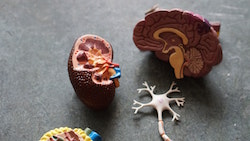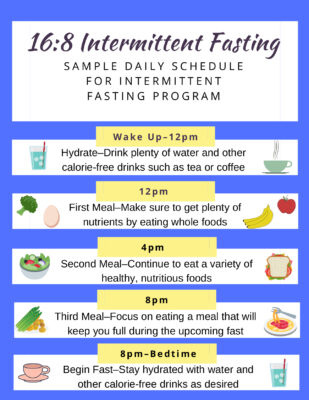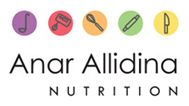04 Mar Intermittent Fasting Benefits
 How Intermittent Fasting can Improve Your Overall Health
How Intermittent Fasting can Improve Your Overall Health
Over the past year, one of the most frequent questions I have been asked is on intermittent fasting (IF). IF has become a popular trend – in fact, it was the top trending Google search term in 2019! If intermittent fasting is something you are interested in, keep reading. I will walk you through the most common and easiest method of IF, and highlight some of the pros and cons and what current research is telling us about this very trendy, yet ancient method of eating.
What is Intermittent Fasting?
Intermittent fasting is a pattern of eating which cycles through periods of eating and fasting. The focus is not so much on what to eat but on when to eat. There are many different ways to intermittent fast. I’m going to focus on the 16/8 method, which is the easiest in my opinion and likely why it’s the most popular.
In the 16/8 method you fast for 16 hours, usually overnight while sleeping, and then have an 8-hour window to eat. Many people will fast through the night and through breakfast, with lunch being the first meal. The window you choose is completely up to you. You could have your eating window from 10 am – 6 pm or from 12 pm – 8 pm. Pick a time frame that works best for your schedule.
While no foods are off-limits when you intermittent fast you want to eat nutritionally dense whole foods as much as possible. If weight loss is a goal, watching added sugars and processed foods are encouraged.
Following the 16/8 method means you are delaying your first meal of the day and not eating anything after dinner. If you snack in the evenings and are looking for a way to break this habit having a cut off time in the evening will be very helpful.
Most people who snack in the evenings, post-dinner, are usually not eating out of hunger but eating as a way to unwind or relax after a busy day, or eating out of boredom. IF eliminates this evening ritual, which can lead to better health outcomes as well as weight loss.
What Can You Eat and Drink When Fasting?
Water! Lots of water! You can also have black coffee or tea, bone broth, and non-caloric beverages. Technically, if you add cream or milk to your tea and coffee, that can break your fast – but do what you can especially when you are first starting out. 
My Experience with Fasting
I have been fasting since I was 8 years old. Ramadan is the 9th lunar month (29 or 30 days) of the Islamic calendar when Muslims all over the world abstain from food and water from sunrise to sunset. As the Islamic calendar is a lunar calendar, the timing of Ramadan changes every year by approximately 11 days. In North America, our fasts during the winter months are short – under 12 hours. But when Ramadan falls in the summer, our fasts are more challenging, lasting upwards of 18 hours near the solstice.
I can say first hand that fasting does not hinder my metabolism or my weight, in fact, I feel clear-headed and energized. Not having my morning coffee is hard and it does take me a few days to adjust. During Ramadan, what I find the most challenging is the exhaustion, stemming not from the fast, but from the broken sleep during the night to wake up for the pre-dawn meal.
Fasting is a part of many cultures and religions as a means to bring focus, discipline, and awareness to our daily lives. Fasting enhances our spiritual connection by refocusing us on what we think we need or want.
In addition to practicing Ramadan for so many years, I have found that in the last few years, I naturally skip breakfast since my mornings are hectic with getting my kids up and ready for school. I am not hungry in the mornings – I just need water and coffee! I find myself hungrier later on in the mornings usually after a workout or once I get a few hours of work done. I feel so much better when I listen to my hunger cues instead of eating for the sake of eating.
What are the Health Benefits of Intermittent Fasting?
Intermittent fasting is the rage right now and there is a good reason for it. The research is pretty impressive and supportive – there have been many animal studies on intermittent fasting and human studies are corroborating the benefits, including:
- Weight loss
- Disease management
- Reducing inflammation and aligning our circadian rhythm
- Improved brain health
Can Intermittent Help with Weight Loss?
Studies on weight loss and intermittent fasting have shown mixed results. Studies have confirmed that weight loss is achieved – specifically, a decrease in belly fat.1, 2 Limiting food intake to only a certain number of hours in the day can help people naturally consume fewer calories without having to strictly calorie count. However, studies have also shown that when it comes to weight loss IF is not superior to a calorie-restricted diet 3 as both methods show similar results with weight loss. However, IF provides many other health benefits in addition to weight loss – such and improved health and longevity.
Blood Sugars and Cholesterol Management
 In many animal studies, IF has been shown to reduce the risk of diabetes and lower blood pressure, cholesterol, and triglyceride (fat in your blood) levels. Human studies are limited but growing. A study done in 2013 looked at both men’s and women’s weight, total cholesterol, HDL (good cholesterol), LDL (bad cholesterol), fasting glucose and triglycerides pre- and post- Ramadan. Researchers found that both men and women had lower LDL and fasting blood glucose post-Ramadan. In the women’s group, HDL cholesterol levels were significantly increased. In males, there was a significant decrease in weight, total cholesterol, and triglyceride levels. 4 Other studies have also shown that fasting during Ramadan is associated with significantly lower inflammatory markers (cholesterol and blood sugars).
In many animal studies, IF has been shown to reduce the risk of diabetes and lower blood pressure, cholesterol, and triglyceride (fat in your blood) levels. Human studies are limited but growing. A study done in 2013 looked at both men’s and women’s weight, total cholesterol, HDL (good cholesterol), LDL (bad cholesterol), fasting glucose and triglycerides pre- and post- Ramadan. Researchers found that both men and women had lower LDL and fasting blood glucose post-Ramadan. In the women’s group, HDL cholesterol levels were significantly increased. In males, there was a significant decrease in weight, total cholesterol, and triglyceride levels. 4 Other studies have also shown that fasting during Ramadan is associated with significantly lower inflammatory markers (cholesterol and blood sugars).
Another small study looked at the eating windows in obese men. They saw that early time-restricted eating (8 am – 5 pm) and time-restricted (12 pm – 9 pm) both showed improved blood sugar control but the earlier time-restricted group (8 am – 5 pm) had lower fasting glucose levels.5
What Happens When We Fast?
When fasting, glucose levels in the body decrease and ketone levels increase. As this occurs, the body goes through “intermittent metabolic switching”, which is a fancy term that basically means that the body is using ketones for energy instead of glucose. The body essentially becomes more efficient at using energy from fat cells. These metabolic changes in the body are responsible for the changes that are seen in blood sugar, blood cholesterol levels, and fat loss. During this switch, the body goes through a recycling phase known as autophagy, where the body gets rid of damaged old cells, in order to make new healthier ones. Autophagy is important to keep cells healthy, without it we may be prone to diseases such as:
- Cancer
- Neurodegenerative disorders
- Infections
- Inflammatory disease
- Aging
- Insulin resistance
Intermittent Fasting and Circadian Rhythm
Our daily sleep-wake cycles, or circadian rhythms, control much more than our sleep cycles. Our body’s 24-hour internal clock is very sophisticated and plays a role in our metabolism, digestion, and hormones – essentially impacting every tissue of our body. IF aligns our eating with our circadian rhythm as we’re typically limiting our eating to a fixed period during the day.
In one animal study researchers split mice into two groups: the researchers put one group on an IF regime and allowed the second group to eat whenever it liked. Both groups consumed the same amount of fat and calories; however, despite having the same energy intake, the IF mice did not develop obesity or metabolic disorders, whereas some of the “free” mice did!6 Scientists believe that having more clearly defined eating cycles might be part of the reason why fasting promotes good health.
We know that people who work shifts have disrupted circadian rhythms, which has been associated with an increased risk of obesity, diabetes, cardiovascular disease, and cancer. Eating during the day and avoiding eating at night can positively impact our health and our circadian rhythm. In fact, studies have shown that intermittent fasting with an earlier window such as 9 am – 5 pm results in greater fat loss and reduced hunger than a later window such as 12 pm -8 pm or 1 pm -9 pm.7
Intermittent Fasting and Improved Brain Health

Intermittent fasting may play a role in keeping our brains sharp. It might even protect against neurodegeneration (loss of structure and function of neurons), which can be promising in delaying the onset of Alzheimer’s disease and dementia. Numerous animal studies have shown that fasting can protect brain health by increasing the number of nerve cells to boost cognitive function. A fascinating study that was published a few months ago explained that when we undergo the metabolic switch from using glucose to ketones – our bodies stimulate the expression of the gene for brain-derived neurotrophic factor (BNDF). 8 BNDF is a protein that promotes the survival of nerve cells (neurons) by playing a role in the growth of these cells, which is involved with learning and memory this is an important point since BNDF naturally decrease with age. If we are able to boost BNDF through intermittent fasting then this we can delay cognitive decline as we age. More human trials are needed to better understand the connection between fasting and brain health.

How to Start Intermittent Fasting
If you would like to try intermittent fasting make sure you ease yourself into it. Start with a 12-hour fast overnight, maybe from 8 pm to 8 am. If you do not wake up hungry then this may be easy for you. If you can consistently do this with ease, start pushing your first meal to 10 am and eventually to noon. You do not have to fast every day. Pick 2-3 days during the week to start, and once you’re in the routine, add days. And don’t forget to stay hydrated with lots of water!
When you have your first meal, make sure it is nutrient-dense – include lean protein, like chicken, lentils, beans or fish along with complex carbs such as brown rice or quinoa and add healthy fats like nuts, seeds, olive oil, and avocado. An example may be a tuna sandwich on rye bread with vegetable soup or a salad with chicken, avocado and nuts. During your eating window eat until you are satisfied. Here is a great visual on how to structure your non-fasting window from the University of Michigan School of Public Health.
Is Intermittent Fasting for Everyone?
Most people can practice IF safely as part of a healthy lifestyle. However, intermittent fasting is not for everyone.
Children, individuals with a chronic illness, and women who are pregnant or breastfeeding should speak to a registered dietitian or their doctor to make sure that they’re getting the nutrients they need. Also, those who are living with diabetes may need to tweak their medication to prevent low blood sugars. Intermittent fasting is also not suited for those with eating disorders or those who have a history of disordered eating or for people who suffer from anxiety. Some signs that intermittent fasting may not be for you are if you feel that intermittent fasting hinders your social plans, makes you feel anxious or if you have feelings of guilt when you are eating outside your eating window. Remember no diet will result in success if you cannot make it a part of your lifestyle. The reason why intermittent fasting has been well received is that the thinking of what you can eat is eliminated – no foods are off-limits. Intermittent fasting can free up your mornings so you can focus on other aspects of your busy life. Plus IF works with all eating preferences: vegan, paleo, plant-based, keto, vegetarian, and flexitarian so there is no need to change the foods you enjoy.
Bottom Line: The research on intermittent fasting is fascinating and animal studies have shown impressive results on how intermittent fasting can improve overall health. However, more long-term human studies are needed. If you decide to try intermittent fasting talk with a registered dietitian to make sure your nutritional needs are being met.
You can still make small lifestyle changes to reap some of the potential benefits of intermittent fasting by implementing the following:
- Avoiding late dinners
- Cutting back on evening snacking
- Listening to your body and eating when you are hungry
- Eating carbohydrates earlier in the day when your body can metabolize them efficiently
I would love to hear your thoughts and experience with intermittent fasting!




Sorry, the comment form is closed at this time.